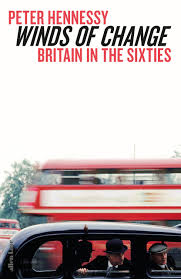Kathryn Hughes at The Guardian:
 It is entirely characteristic of Hennessy to leave space in this seismic account for the free play of individual quirks. The Soviet leader Nikita Khrushchevemerges as an oaf who could easily have postured his way into a third world war simply because he wanted to send a message to Mao Zedong about who was the biggest, baddest kid in the communist playground. Hennessy presents Harold Macmillan as a wounded war hero from the Somme – the old man still lived with a piece of Krupp ordnance buried in his thigh – who could never quite bring himself to trust the Germans since they were, he pointed out privately, the “people who have tried to destroy us twice in this century”. All the same, “Mac”, the unofficial hero of this book, was prepared to overlook his instincts about “the Teuton” if it meant advancing his grand design. This was an ambitious plan to position Britain as the hinge between the free world’s two great blocs. On the one hand was the Anglo-American alliance, the historical special relationship that had received such a boost during the recent war and was maintained under Eisenhower and, later Kennedy. On the other was a Europe that was forging itself into a bulwark against communism, and Britain’s relationship with it. Much as Germany still pained Mac literally, it made overwhelming sense for Britain to become fully European.
It is entirely characteristic of Hennessy to leave space in this seismic account for the free play of individual quirks. The Soviet leader Nikita Khrushchevemerges as an oaf who could easily have postured his way into a third world war simply because he wanted to send a message to Mao Zedong about who was the biggest, baddest kid in the communist playground. Hennessy presents Harold Macmillan as a wounded war hero from the Somme – the old man still lived with a piece of Krupp ordnance buried in his thigh – who could never quite bring himself to trust the Germans since they were, he pointed out privately, the “people who have tried to destroy us twice in this century”. All the same, “Mac”, the unofficial hero of this book, was prepared to overlook his instincts about “the Teuton” if it meant advancing his grand design. This was an ambitious plan to position Britain as the hinge between the free world’s two great blocs. On the one hand was the Anglo-American alliance, the historical special relationship that had received such a boost during the recent war and was maintained under Eisenhower and, later Kennedy. On the other was a Europe that was forging itself into a bulwark against communism, and Britain’s relationship with it. Much as Germany still pained Mac literally, it made overwhelming sense for Britain to become fully European.
more here.
